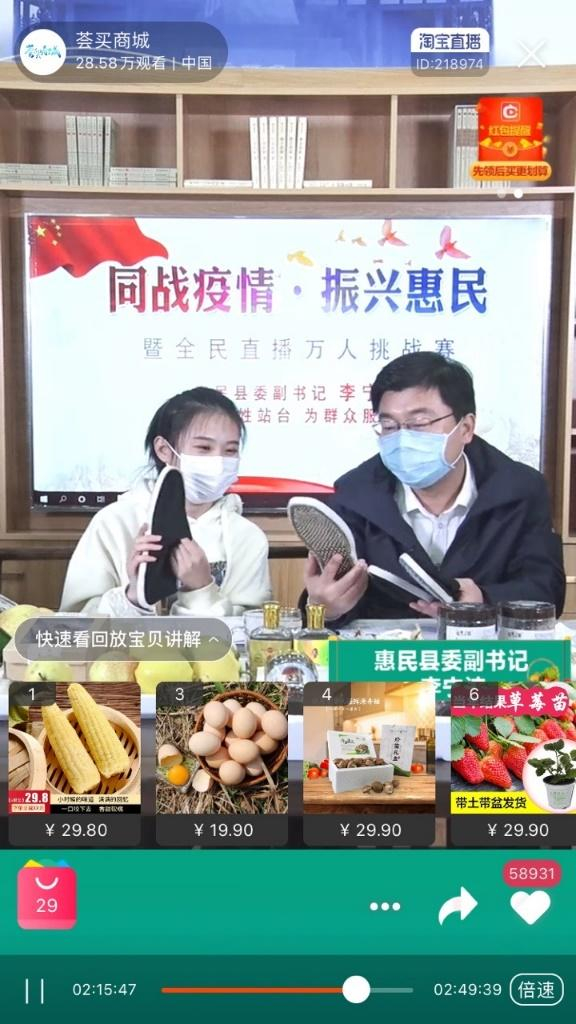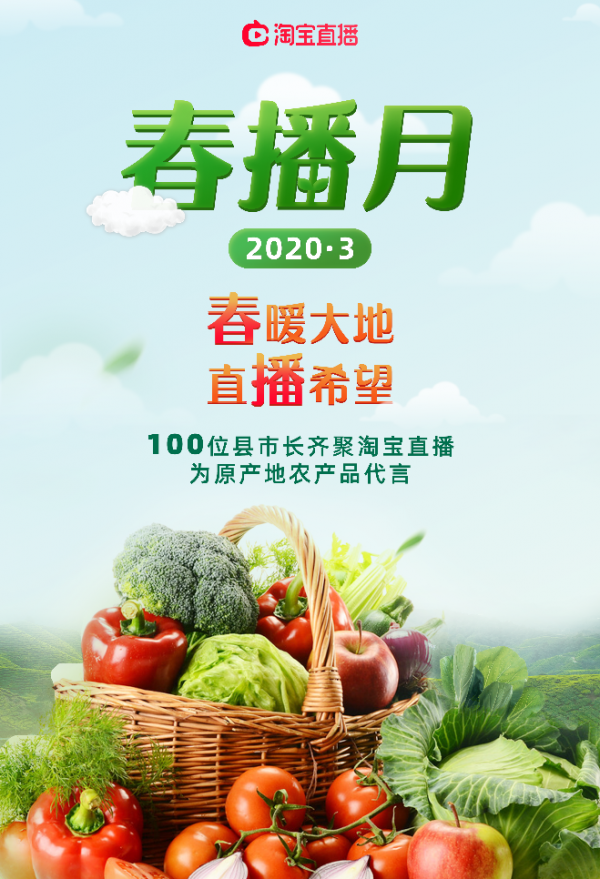With lockdowns disrupting traditional supply chains, several Chinese mayors are turning to livestreaming to find new ways to help farmers sell products that would otherwise go to waste.

Workers pack kumquats at an e-commerce company at Rong'an County, Liuzhou City, south China's Guangxi Zhuang Autonomous Region, March 1, 2020. /Xinhua
Workers pack kumquats at an e-commerce company at Rong'an County, Liuzhou City, south China's Guangxi Zhuang Autonomous Region, March 1, 2020. /Xinhua
Chen Wenmin, mayor of Rong'an County in the city of Liuzhou, south China's Guangxi Zhuang Autonomous Region, managed to sell 60,000 kg of kumquats in three hours on March 2. With more than 100 million viewers, the once partially unsalable fruit soon became an internet-famous specialty.
On March 24, Lu Minggang, mayor of Shenze County, north China's Hebei Province, joined a live broadcast to help promote the sale of textiles, one of the pillar industries in the region which had been stricken hard by the closure of trade fair and offline stores due to the epidemic. The livestream attracted about 260,000 viewers and sold more than 4,000 pieces in a single day.
In Sanya, a coastal city in south China's Hainan Province, the livestream with the mayor of the city, A Dong, as the guest host, attracted over 25,000 views and 30,000 kg of mangoes were sold out within two minutes on Taobao Live.

Li Ningbo, deputy secretary of Huimin County, east China's Shandong Province, live streams on March 15 to help farmers sell agricultural products and local delicacies on Taobao Live. /Screenshot via Taobao
Li Ningbo, deputy secretary of Huimin County, east China's Shandong Province, live streams on March 15 to help farmers sell agricultural products and local delicacies on Taobao Live. /Screenshot via Taobao
Nearly 3,300 dozens of eggs, 7,500 ears of corns, 1,500 kg of garlic and 1,000 kg of mushroom… this is not the total volume traded in an outdoor food market per day, but a record set by Li Ningbo, a deputy secretary of Huimin County, east China's Shandong Province. Within three hours of a live broadcast on March 15, Li showed off nearly 30 kinds of agricultural products, including local delicacies such as black beans, honey and egg as well as some special products such as traditional cotton shoes, hemp ropes and flower seedlings, harvesting a record-high number of page views.
Local farmers are reaping the rewards of their hard work. Lu Yongchun, another deputy county mayor in Shandong Province, stood in front of the camera to advertise purple sweet potatoes on the e-commerce platform Pinduoduo. As one of Linshu County's specialties, purple sweet potatoes, usually expected to be sold out before March, are suffering poor sales this year. In the first two hours of Lu's live broadcast, 40,000 kg of purple sweet potatoes were sold. They had sold out.
Lu said that livestreaming e-commerce can reach more potential customers while avoiding gatherings to reduce risk of cross-infection. It can also help to boost the popularity of regional specialties, increase farmers' income and alleviate poverty, reported Xinhua.

Taobao Live initiated a special event starting from March where a hundred city and county mayors were invited to promote agricultural products via live streaming. /Taobao Live
Taobao Live initiated a special event starting from March where a hundred city and county mayors were invited to promote agricultural products via live streaming. /Taobao Live
Livestreaming, an emerging popular tool for selling produce that would have otherwise gone to waste, seems to have been unexpectedly fostered by the coronavirus outbreak. Aside from the utmost efforts made by government officials, online platforms have also played a part to support farmers in rural areas, a way of giving back to a vulnerable part of society.
A hundred city and county mayors across the country have been invited to join the "Spring Sowing Month," a livestreaming event initiated starting in March by Taobao Live platform, where government officials could live broadcast to promote agricultural products. Another massive online retailer, JD.com, has reportedly helped 50 local government officials nationwide promote farm-fresh produce on JD Live since the coronavirus outbreak.
Meanwhile, the e-commerce websites are not alone. Some video sharing apps in China, such as Kuaishou and TikTok, also facilitated these new, yet rising, livestreamers by asking social influencers to help host the live broadcast. Whether in a chicken shed, aside a fish pond or in a vegetable greenhouse or an orchard, though the majority of mayors had just jumped on the bandwagon of livestreaming, many have hit a record in terms of sales volume.

Lu Yongchun, deputy county mayor of Liushu County in east China's Shandong Province, sits in front of the camera to advertise purple sweet potatoes on the e-commerce platform Pinduoduo. /Guang Ming Daily
Lu Yongchun, deputy county mayor of Liushu County in east China's Shandong Province, sits in front of the camera to advertise purple sweet potatoes on the e-commerce platform Pinduoduo. /Guang Ming Daily
While plenty of mayors being transformed into livestreamers, it's an indicator that government officials are proactively trying to solve problems in their areas, it shouldn't be ignored that the products are of quality, said Dai Yanjun, professor of the Central Party School of the Communist Party of China. He mentioned that since the purchases were made based on trust of those officials, even a single occurrence of a quality issue may be detrimental to the credibility of the government, and will certainly impact product sales, reported by China News Service.
Though Chinese mayors have only recently turned to livestreaming to advertise regional specialties, farmers in rural China began to embrace online platforms, especially livestreams, years before the coronavirus outbreak.